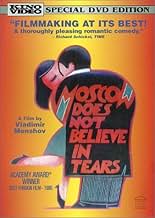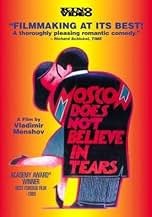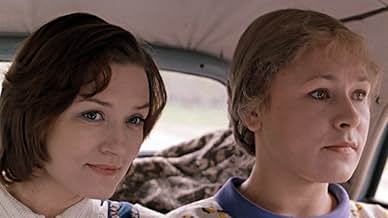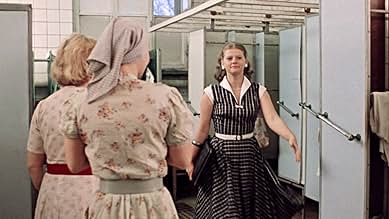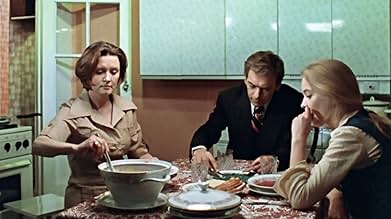VALUTAZIONE IMDb
8,0/10
15.159
LA TUA VALUTAZIONE
Questa è la storia della vita di tre amiche dalla giovinezza all'età autunnale. I loro sogni e desideri, amore e disillusioni, carriere e vite diverse e un grande amore tardivo.Questa è la storia della vita di tre amiche dalla giovinezza all'età autunnale. I loro sogni e desideri, amore e disillusioni, carriere e vite diverse e un grande amore tardivo.Questa è la storia della vita di tre amiche dalla giovinezza all'età autunnale. I loro sogni e desideri, amore e disillusioni, carriere e vite diverse e un grande amore tardivo.
- Regia
- Sceneggiatura
- Star
- Vincitore di 1 Oscar
- 3 vittorie e 1 candidatura in totale
Vladlen Paulus
- Pyotr Lednev
- (as V. Paulus)
Recensioni in evidenza
This film makes one wonder what exactly the heroine worked so hard for. A young girl from a small town comes to Moscow and becomes pregnant. Her lover repudiates her, the lover's mother humiliates her, telling her that she is not a good fit for her big-city dandy son. Rather than leave Moscow and go back to her parents, or try to perform an abortion on herself, the heroine has the baby. She works hard at the factory, getting up at 5 AM every morning, passes grueling entrance exams into college, becomes an engineer -- all while raising her little girl as a single parent and an unwed mother. Bold subject matter for a Soviet movie made in the seventies.
Then -- a compromise: the heroine who, sixteen years after her ordeal, has a good life, a good home, and a prestigious managerial job, falls head over heals for a man who treats her like dirt.
"Moscow Does Not Believe in Tears" was made almost at the same time as the equally celebrated "Workplace Romance" ("Sluzhebnyj Roman"), and they are, in a sense, competitors. Both movies are about single women in their mid- to late thirties who made a brilliant career but were never married. Both heroines are presented as strong-willed, independent individuals in managerial positions, whose lives are nevertheless missing something. But if "Sluzhebnyj Roman" says that life is incomplete without love, "Moscow Does Not Believe in Tears" says that life is incomplete without a man.
Women of the older generation are all in love with "Moscow"'s main male character -- the heroine's ultimate husband. I cannot fathom why -- the actor's cute, but his character is unnerving. One does not need to be a feminist to have a strong urge to throw this man down the stairs. He stifles every impulse of individuality in her; he presumes to know what she wants, what's proper for her and what's not; he patronizes her; he pushes her around. On the train, he begins their acquaintance by commenting: "You have the eyes of a woman who is not married." (What kind of eyes are those?) I cannot see why one would find any charm in such familiarity and cocky self-assurance from a stranger.
It's worth noting that the corresponding character in "Sluzhenyj Roman" -- an excessively mild-mannered, shy man -- learns to stand up to the bossy heroine, but does so without disrespecting her. The character in "Moscow", on the contrary, puts the heroine in her proper place -- which is to be quiet and follow orders.
I think that a Western critic would perceive the ending of "Moscow Does Not Believe in Tears" as ironic and sad. The heroine, a woman who spent her life making something of herself by overcoming seemingly insurmountable obstacles, is last shown fussing around her kitchen for the benefit of a man who was not with her on that long journey, who dares to raise his voice at her in her own home, while eating her food, and who acts as if his very physical presence at the table confers a rare privilege on a woman whose clock is ticking.
Then -- a compromise: the heroine who, sixteen years after her ordeal, has a good life, a good home, and a prestigious managerial job, falls head over heals for a man who treats her like dirt.
"Moscow Does Not Believe in Tears" was made almost at the same time as the equally celebrated "Workplace Romance" ("Sluzhebnyj Roman"), and they are, in a sense, competitors. Both movies are about single women in their mid- to late thirties who made a brilliant career but were never married. Both heroines are presented as strong-willed, independent individuals in managerial positions, whose lives are nevertheless missing something. But if "Sluzhebnyj Roman" says that life is incomplete without love, "Moscow Does Not Believe in Tears" says that life is incomplete without a man.
Women of the older generation are all in love with "Moscow"'s main male character -- the heroine's ultimate husband. I cannot fathom why -- the actor's cute, but his character is unnerving. One does not need to be a feminist to have a strong urge to throw this man down the stairs. He stifles every impulse of individuality in her; he presumes to know what she wants, what's proper for her and what's not; he patronizes her; he pushes her around. On the train, he begins their acquaintance by commenting: "You have the eyes of a woman who is not married." (What kind of eyes are those?) I cannot see why one would find any charm in such familiarity and cocky self-assurance from a stranger.
It's worth noting that the corresponding character in "Sluzhenyj Roman" -- an excessively mild-mannered, shy man -- learns to stand up to the bossy heroine, but does so without disrespecting her. The character in "Moscow", on the contrary, puts the heroine in her proper place -- which is to be quiet and follow orders.
I think that a Western critic would perceive the ending of "Moscow Does Not Believe in Tears" as ironic and sad. The heroine, a woman who spent her life making something of herself by overcoming seemingly insurmountable obstacles, is last shown fussing around her kitchen for the benefit of a man who was not with her on that long journey, who dares to raise his voice at her in her own home, while eating her food, and who acts as if his very physical presence at the table confers a rare privilege on a woman whose clock is ticking.
Moving story of three young girls who come to the capital of Soviet Russia in search of their fate. They play rich girls to impress the guys, and succeed in doing so. Katya (the protagonist) does not like the game, but still goes with the girls. But the truth is soon revealed, and Katya's boyfriend breaks up with her. She is pregnant and has to raise a kid alone in a tiny dorm room, and still try to get an education.
The second part shows the three girlfriends 20 years later. Katya is a very successful business lady and has a wonderful daughter. But she hasn't found real love, and the story takes a new turn when she meets Gosha in a train. They both now have to find ways into each other's established lives. A very nice and sincere story that people watch over and over again!
The second part shows the three girlfriends 20 years later. Katya is a very successful business lady and has a wonderful daughter. But she hasn't found real love, and the story takes a new turn when she meets Gosha in a train. They both now have to find ways into each other's established lives. A very nice and sincere story that people watch over and over again!
This is a tribute to the Soviet era some people in Ukraine still consider to be the best years of their lives.I saw the movie in my child years, but didn't pay much attention to it. Now, when I study film history and techniques, the movie revealed to me some dark sides. "Moskva sliezam nie verit", I guess, tells a story of a humble Soviet woman in pursuit for happiness with a beloved man. This woman does not care about feminism. True love of a man-"stronghold", a man who is ready to comfort her any time she needs--that is what she is searching for in life. The movie shows some cloudy moments in the way to happiness three female friends go along. And the movie ends up where it should--an "island of placid" I watch it in original. Have to say, many phrases from the movie are cited in Ukrainian and Russian-speaking communities these days.
Culturally interesting since this occurs in a Communist country that US propaganda gave little insight on the values and realities of the people. We see idealistic poets who say the older generation made mistakes, women promoted to executive positions, a film produced by the State yet approaching sexual themes, Western idolization, the drudgery of repetitive industrial work, and class distinctions between the haves and have-nots.
Also of interest is the protagonist's view of herself. Without revealing plot twists, it is suffice to say that a woman is socially seen as submissive to the man. This is a shock to Western sensibilities of women's equality, especially as we see her ordeals as a result of a man's selfishness and dominance. What is revealing is that she, herself does not rebel against the System. She works within the parameters, creates her own success, and becomes transformed.
Being Western, I found myself questioning whether she had truly achieved something. The crown of achievement, we are taught, is independence, equality. Whereas she achieved that in a career and in her lifestyle, in her heart, she yearned for a man, to be the little wife, and to submit herself to a patriarchal marriage. But, in the end, who are we to judge another's happiness?
Also of interest is the protagonist's view of herself. Without revealing plot twists, it is suffice to say that a woman is socially seen as submissive to the man. This is a shock to Western sensibilities of women's equality, especially as we see her ordeals as a result of a man's selfishness and dominance. What is revealing is that she, herself does not rebel against the System. She works within the parameters, creates her own success, and becomes transformed.
Being Western, I found myself questioning whether she had truly achieved something. The crown of achievement, we are taught, is independence, equality. Whereas she achieved that in a career and in her lifestyle, in her heart, she yearned for a man, to be the little wife, and to submit herself to a patriarchal marriage. But, in the end, who are we to judge another's happiness?
If you try to understand the meaning of Soviet mode of life (especially place of woman in Soviet society), this film represents the best one you can find for this purpose. The destinies of three women are depicted in clear and awesome way, and the most important you can see is that whatever happens in life, try to be optimist and to do everything not to give up living and being happy.
Lo sapevi?
- QuizOne of four Russian films ever to win Academy Award for Best Foreign Language Film. The other are Guerra e pace: Natascia - L'incendio di Mosca (1965), Dersu Uzala - Il piccolo uomo delle grandi pianure (1975) and Sole ingannatore (1994).
- BlooperWhen Lyudmila and her friend approach the office building she is wearing a pair of white shoes. Once inside the building the shoes color changes to black.
- Citazioni
Lyudmila Gurina: Don't cry.
Lyudmila Gurina: You know what Moscow thinks of tears.
Lyudmila Gurina: We shouldn't be sitting around, we should do something.
- ConnessioniFeatured in Lyubov i golubi (1985)
- Colonne sonoreAleksandra, Aleksandra
Written by Sergey Nikitin and Dmitry Suharev and Yuri Vizbor
Performed by Tatyana Nikitina and Sergey Nikitin
I più visti
Accedi per valutare e creare un elenco di titoli salvati per ottenere consigli personalizzati
- How long is Moscow Does Not Believe in Tears?Powered by Alexa
Dettagli
- Data di uscita
- Paese di origine
- Sito ufficiale
- Lingua
- Celebre anche come
- Moscow Does Not Believe in Tears
- Luoghi delle riprese
- Aziende produttrici
- Vedi altri crediti dell’azienda su IMDbPro
Botteghino
- Budget
- 900.000 USD (previsto)
- Lordo in tutto il mondo
- 217 USD
- Tempo di esecuzione2 ore 30 minuti
- Proporzioni
- 1.37 : 1
Contribuisci a questa pagina
Suggerisci una modifica o aggiungi i contenuti mancanti

Divario superiore
By what name was Mosca non crede alle lacrime (1980) officially released in India in English?
Rispondi

